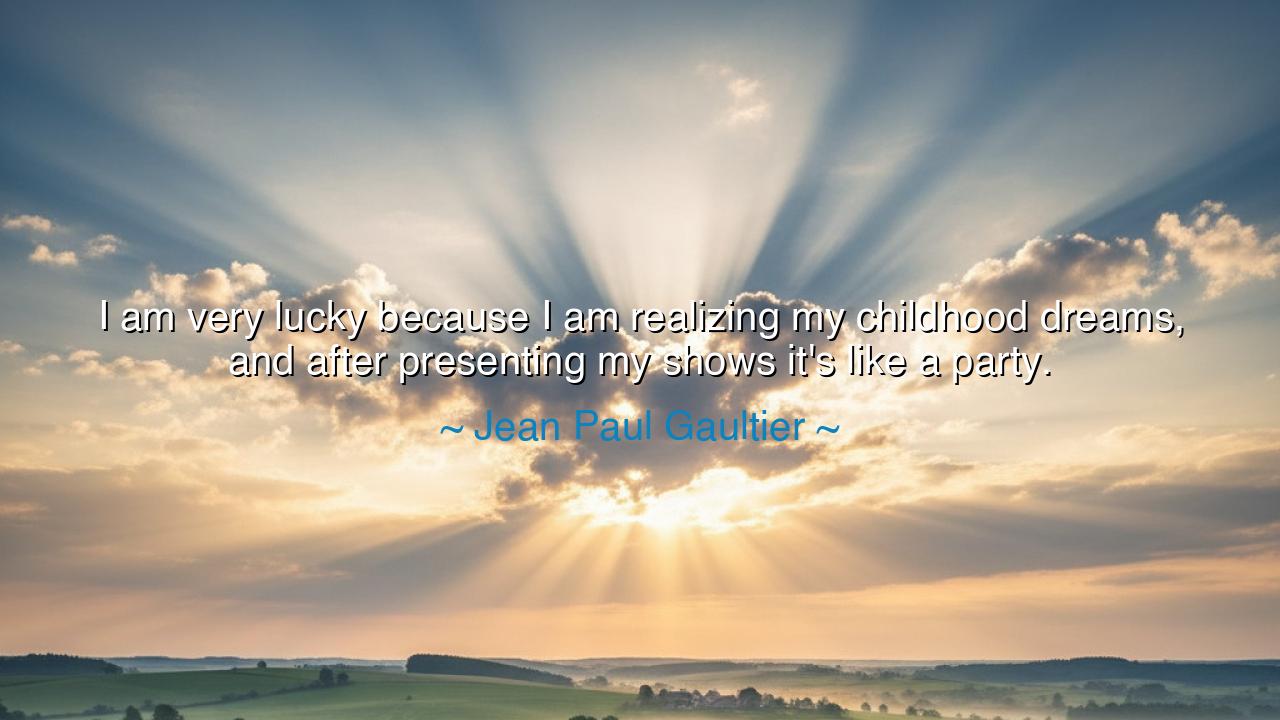
I am very lucky because I am realizing my childhood dreams, and
I am very lucky because I am realizing my childhood dreams, and after presenting my shows it's like a party.






“I am very lucky because I am realizing my childhood dreams, and after presenting my shows it’s like a party.” — Jean Paul Gaultier
Listen well, O dreamers and makers of the morrow, for within these joyful words of Jean Paul Gaultier lies a sacred truth of human purpose: that the highest blessing of life is not wealth nor acclaim, but the realization of one’s childhood dreams. To create as one once imagined, to stand in the bright fire of one’s own vision made real—that is the triumph of the spirit. When Gaultier, the magician of fashion, spoke these words, he was not boasting of his success; he was offering gratitude. For he knew that many live and die without tasting that sweet moment when imagination becomes creation, when the dreamer awakens to find his dream walking beside him, alive.
From his youth, Gaultier was a child not of privilege, but of passion. While other boys played with toys, he played with ideas—with fabrics, drawings, and daring visions of beauty that defied the ordinary. He dreamed not of riches or rank, but of expression, of showing the world that fashion could be freedom. In the stern France of his youth, he was laughed at for this—mocked for his eccentricity, scolded for his imagination. Yet he held to his vision with the devotion of a priest tending sacred fire. When at last he rose to fame, his shows were not mere displays of clothing—they were celebrations of humanity itself, fierce and joyful and alive. Thus he could say, “after presenting my shows, it’s like a party”—for he was not simply showing garments, but rejoicing in creation.
To understand his words is to remember that the dream of childhood is the purest flame of the soul. As we grow, the world tries to extinguish it—with fear, with conformity, with the gray voice of practicality. Yet those who keep that inner fire alight become creators, inventors, and visionaries. Think of Leonardo da Vinci, who as a boy gazed upon birds and imagined the flight of man; or of Walt Disney, who once drew a cartoon mouse on scraps of paper in a garage and dreamed of worlds unseen. These were men who refused to forget their inner child. Their genius was not learned—it was remembered.
There is also wisdom in Gaultier’s sense of celebration. His “party” is not the noise of vanity, but the joy of fulfillment. When a person creates something true to their soul, it becomes an offering to the world—a reason to dance, to laugh, to breathe more deeply. This is why the greatest artists, after their labors, do not rest in solemnity but in joy. They have joined hands with their younger selves and said, “We did it.” There is something profoundly spiritual in that union of past and present—the child who dreamed and the adult who dared to make that dream real.
But take heed, for this path is not easy. Between the dream and its realization lies the desert of doubt, the valley of toil, the storm of rejection. Many abandon the journey midway, believing the dream foolish or unattainable. Yet those who persist find that the struggle itself is sacred, for it purifies the will. Luck, as Gaultier calls it, is never blind chance—it is the blessing that visits those who labor with joy and faith. The gods favor not the idle, but the devoted. When he says “I am lucky,” he speaks with humility, acknowledging that fortune follows perseverance.
Let this be the lesson you carry: guard your childhood dreams as treasures, for they are maps to your destiny. Do not let the world’s cynicism erase their colors. When the voice of doubt whispers, remember that every masterpiece was once a childish sketch; every empire began as a fragile vision. Live with passion, create with courage, and when your work is done, celebrate as Gaultier did—not with arrogance, but with gratitude, for you have kept faith with your own soul.
And so, O builders of tomorrow, know this: to realize a dream is to restore the divine order between heart and hand, between the dreamer and the doer. When you reach that place, when the labor of your life blooms into joy, may you, too, say with laughter and light in your voice: “I am lucky.” And may every day thereafter be your party—a feast of creation, gratitude, and love for the dream that refused to die.






AAdministratorAdministrator
Welcome, honored guests. Please leave a comment, we will respond soon